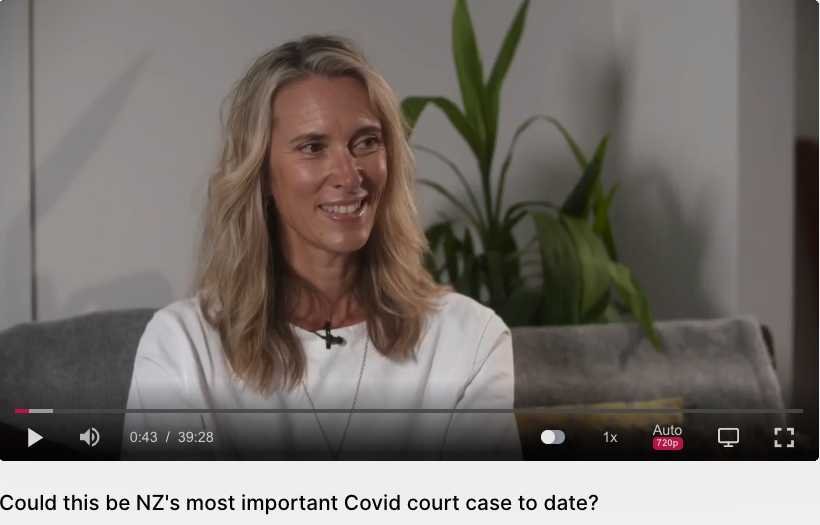This article was originally published on the thelookingglass.co.nz and is republished here with permission.
The Hood: ‘Kiwi kids are getting jabbed with a product different to the formulation that was approved by Medsafe’
The Looking Glass speaks to co-director of The Hood, Sereca Friend, about why they are challenging the Government’s decision to approve the Pfizer injection for five-to-11 year olds in the High Court later this month.

Something that is not widely known is that the New Zealand drugs regulator Medsafe has allowed Kiwi kids to be injected with a different formulation of the Pfizer product than the one that safety studies were supplied for, says The Hood’s Sereca Friend.
Friend, who founded the collective of parents, doctors, scientists and concerned citizens that is facilitating taking the Government to court over the approval of the Pfizer jab for five-to-11 year olds, says Pfizer produced the safety studies for the first formulation but then supplied an altered formula.
“They created an updated paediatric version of the product that they then supplied us with, but they didn’t supply updated safety studies, because they argued the two ingredients they changed were just buffers. OIA’s sent by The ‘Hood were replied to by Medsafe, expressing that as these were only stabilisers, and in trace amounts, Pfizer had replied this was ok.”
Friend argues, “any change to an experimental formulation for children must be rigorously researched, emergency status is not an excuse to skip safety trials!”
The extra ingredient in question is Tromethamine (comprised of two ingredients), she says.
“The whole thing with Medsafe, is in the name, they have a responsibility to keep our medicines safe and to demand more from Pfizer and companies supplying medications for children, and healthy individuals. It’s not good enough. They have a duty to protect all of us, but, especially children.”
This is just one of the things you probably never knew about the paediatric jab that Friend and her colleagues at The ‘Hood, hope will get some attention by forcing the Government to fess up about its approval process and the data they used.
Despite the fact that an interim injunction brought by The ‘Hood earlier this year failed to pause the roll out of the jab to kids, Friend says they believe it probably stopped the Government introducing a vaccine mandate for kids to do community activities, such as sports and peer related events.
“After the rollout began, we were witness to emails expressing the announcement of upcoming restrictions on five-to-11 year olds. I know that those decisions were reversed and we think, had this court case not happened, we wouldn’t be in the place we are in right now. There would be a lot more children vaccinated. The majority of the 12-to-15 year olds that got it, did so for reasons other than health – to participate in life, as they should be free to do”.
The most shocking part for Friend, she says, is why we are injecting kids in the first place when there is zero risk for kids from covid.
“Secondly, it’s the media campaign and the despicable use of children to protect others. That goes against the Care of Children Act. It is unethical to give a child a treatment to protect another person. The fact that the media and the Government have openly promoted that you should go and get your children jabbed to protect your whanau, and that it’s a responsible thing for a child to do. It’s completely against their human rights and yet it is openly and utterly abused in this situation.”
There is also risk for kids from adverse reactions to the product. Pfizer’s own data stated it could not calculate the risk of myocarditis for children because the study wasn’t long enough, but this didn’t stop Medsafe approving it.
Friend states their evidence shows “Our own CARM website shows over a 5000% increase in adverser event reporting in the last year alone. An alarming increase, that should be raising serious red flags.”
“With the adults, everything was done on guestimates and modelling because it was new, but, once we got to the kids we had alarming evidence based on actual data, and actual real life problems, with massive red flags. We know. We don’t use any modelling in our case. We use real world data. We can reference things that the Government knew prior to approving this product, that was solid evidence.”
Friend says the precautionary principle is a must when considering giving children medications.
“Children and young people, you don’t mess about with them and you don’t experiment on them. The fact that their studies state ‘we can’t tell you about the risk of myocarditis because the studies were not long enough’, and Medsafe says ‘no worries’. As a parent, it’s like, ‘I’m sorry, what?!’.”
I asked Friend what the worst case scenario was in terms of the court case outcome.
“I don’t believe that there is anything worse than what we are in at the moment. Not going ahead is the worst case. Once we are finished in court we can publish reports that will become public record, this means that family court cases can reference things that our experts have clearly laid out. Our goal is to build awareness.
“The Government could still bring in mandates for this age group, and the booster for five-to-11 year olds and the release of the six month-to-four year olds jab is likely to be approved here next”, she says.
The FDA in the United States is on the cusp of approving the injection for the preschool age group this week. The New Zealand public has a chance to stop that with this case.
“Our evidence is frickin’ amazing and people need to hear it, we need to be in front of the media and make them listen. They will only do that when we make it to court, when it’s public interest and they have a responsibility to report it,” she says.
For a rundown of The Hood’s expert witnesses go here.
A substantive review of both parties (The Crown vs The Hood) expert evidence will take place on 27 June and 28 June at the High Court in Wellington.
The Hood still needs to raise $106,500 to pay for the $250,000 judicial review, and is accepting donations for just four more days.
What happens if they can’t raise the remaining amount?
“The issue is now that we have to pay our bills or we won’t go to court. No extension, that’s it, the case heart-breakingly ends there.”






